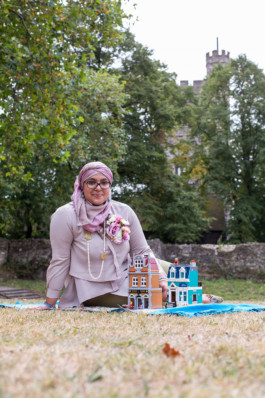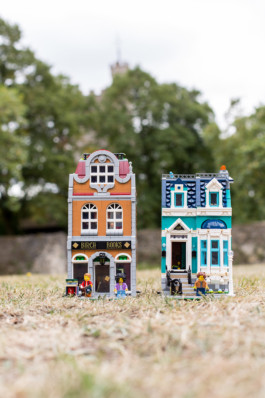Onjali: “We get treated like we’re a little bit dumb because we believe in God”


listen:
Content warning: contains descriptions of bereavement
Photography: Tim Mitchell
Audio Producer: Melissa Viney
Music: Gethsemane by Emily Maguire
www.emilymaguire.com
read:
Okay, so it’s kind of fallen apart, but it’s okay.
This was the bookshop that I built during lockdown, in lego form. And this is the house that went next door to it. So I have not touched Lego since school days, primary school days. And it wasn’t until late last year when I went to a school to do a school talk. And at break time the teachers were like, ‘Oh, do you want to have a wander around the school?’
And I said, ‘Yes, absolutely.’
A windows fallen out. And these two little kids were playing with Lego. One wasn’t… one had his leg in a cast.
And I said, ‘Oh, what are you doing?’
And he said, ‘I can’t go out to play. So I picked a friend today to come play Lego with me’.
And I said, ‘Do you mind if I play with you?’
And he said, ‘No’.
And she said, ‘No’.
And I had the best 15 minutes of my entire life up until that point. I was like, why should I stop playing Lego? It was so much fun just to sit and create something with them. And you don’t think about anything; you’re just doing. And at the end of it, you have something that you’ve built. So in lockdown, I thought: what can I do that will completely take my mind off of it? And that I would enjoy.
And so I ordered this really expensive Lego set, which is not great for a beginner. It took me like two weeks to complete.
But I had so much fun.
My name is Onjali Rauf. I am a children’s author and the founder CEO of two nonprofit organisations: one called Making Herstory, which aids women and children fleeing domestic violence and trafficking, and O’s Refugee Aid Team, which works to supply aid and goods to frontline refugee services in Calais and Dunkirk in France and beyond.
My bubble in lockdown was my mum, who’d just turned 60 in January, and my brother. He and my mother literally were my worlds, and they are my worlds; they’ll always be my walls.
My diary was my one tool of complete honesty. We have lost 19 members of our immediate family in the last four months. And this isn’t just in the UK, this is also in Italy and America.
I’m Asian. So we have you know, 50,000 relatives all across the world. But it was just – these relatives were very in particularly close to my mother. And it was really painful to see my mother having to accept this information. And it’s not just myself – you know, to hear from friends that they’re going through the same kind of things, especially from the South Asian and Somali communities. It was really, really painful. And there’s no way you can talk about this really. So my diary was the go to place to go and grieve really, because we couldn’t go to the funerals; we couldn’t go and hug our families; we couldn’t be together. And one of the things that I’ve told everyone, especially my friends is, when this, whatever this is, is over, one of the first things we will have to do is make time to just sit and grieve with our families. The remaining members of our families, wherever they are.
So the 19 deaths in my family are all through Covid. Most of them were frontliners, so they were doctors, nurses; they were taxi drivers, they were shop owners. And most of these people, most of my family who were working in those roles, had to go into work no matter how bad the situation was, or felt compelled to try and help. So throughout lockdown, I would turn to my diary to sit and pour out my thoughts and feelings.
And this is an entry from seventh of April 2020. And the time is marked as just sunset.
I have let go the feeling of complete helplessness that has plagued me this past few weeks, in particularly with regards to the refugee crisis. So many are dying around us. It is unfathomable. And all you can hear here are sirens. In just 72 hours poof, gone, taken to God. And no one can say their farewells, but at the prayer mat. Yet somehow through it will go on. The birds go on.
So, 2017. Last major surgery – when I was in lockdown individually – was the time that I had the most creative period of my life. Which led to the creation of my first children’s book The Boy At The Back Of The Class. During that time, I literally… I couldn’t watch television, I was in too much pain. I couldn’t bear to get up. I couldn’t go anywhere. So the only thing I could do was start to create stories in my head for myself. And that led to the creation of The Boy At The Back of The Class and starting to think about – more deeply – about the refugees that I had seen in the camps. Snd especially the children ,and putting them and their hearts into what I was writing.
So it really helped me cope with what was going on with myself. And again, in this lockdown, I’ve had to write another book, The Night Bus Hero, and ironically, that centres on homelessness. So it’s like every chapter felt like an irony – because I’m trapped at home.
It’s not the space that I write in, I like to be outside when I’m writing. I like to see people when I’m writing. So, to be outside. Not to be outside and to be trapped in the home and to write about homelessness was quite… was quite an irony.
The ocean is really important to me. So the first thing I did when I could after lockdown was go to the sea. The ocean means so much, as it does for the refugees who’ve managed to survive it. And whenever I’m crossing the channel to get to the refugee camps… just the vastness of it, and the eternalness of it reminds me that actually, I’m just, you know what – we are so small in this wider world. So I love the sound of the ocean.
Being a Muslim woman of faith and of colour, you feel as if you’re having to fight just to get in the room. And that’s always been the case, and it’s always been a fight. Whether that’s with refugee works, or whether that’s with women’s rights, your presence is always questioned in a way. As in: I think we get treated a little bit dumb because we believe in God. I think that’s like, oh, you’re a little bit silly. If you believe in God and then you’re coming up with women’s rights stuff… You know, I have faith but it doesn’t mean that I’m, I’m, you know, I’m of a misogynistic faith. I’m not of a… so it’s kind of trying to battle all of that as well.
Faith is my foundation. It’s the ground I walk on. I have questioned it – of course I have. I have questioned God. I have questioned my faith. I’m Muslim. I wear a headscarf, I’m very visibly a woman of faith, which doesn’t make life easy, especially with things that are going on in the world with regards to how Muslims are seen and how they’re viewed by… not just people but also, you know, politics. So travelling as a Muslim is never easy. Wanting to do things as a brown woman of faith – of visible faith – is never easy. But I cannot live my life without it.
And we have the word Jihad in Islam – and it’s been politicised to mean all sorts of awful things – but Jihad essentially means battling yourself. So battling those moments when you lose your faith, battling those moments when you are at your lowest and you feel as if there’s nothing there helping you – it’s to climb back up again, and to face yourself in your fears, and to continue.
That’s what the true meaning of jihad is. And that is a daily thing for everyone.
An Empathy Museum project made with the support of NHS England and NHS Improvement, The Health Foundation, and Arts Council England